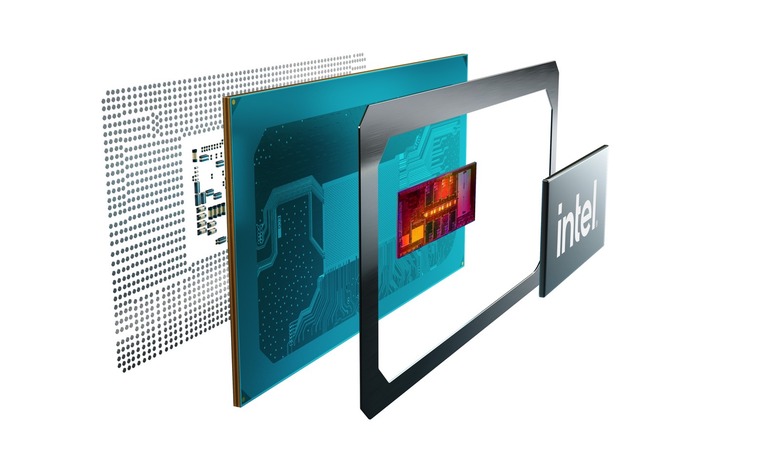Intel Just Launched Its Next-Gen Laptop Chips To Compete Against Apple's M1 MacBooks
If there's anything Intel stood out for so far this year, that's the massive ad campaign that targeted the M1 MacBooks. Intel went out of its way to slam Apple's M1 chips that were launched last November. The M1 powers four different Macs, including the new Air and Pro, and the 2021 iPad Pros run on the same exact silicon. The M1 is arguably one of the most exciting computing innovations of 2020, one Intel can't quite match. The M1 is a 5nm ARM chip similar to the chip powering the iPhone 12 series. M1 Macs have been praised for their performance and battery life (on laptops), and Intel largely failed to come up with any criticism that can truly stick. The M1 does have limitations that Intel tried to highlight, but they're limitations that Apple will likely correct in the future, such as better gaming performance and support for multiple monitors.
Against that backdrop, Intel has just launched its next-gen laptop chips to rival the M1 MacBooks, the 11th-gen Intel Core processors that will power consumer and business laptops this year. Intel made a big deal about its new Intel Core H-series processor (codenamed Tiger Lake-H) that will power plenty of "enthusiast" devices. Enthusiast is a big buzzword for the Tiger Lake-H series.
Intel says the 11th-gen Intel Core H-series mobile chips include the Core i9-11980HK, which happens to be the "world's best gaming laptop processor." Gaming is a massive topic in Intel's announcement, and the new Intel chips will deliver great gaming experiences at various price points and form factors. Not all the Tiger Lake-H chips might offer the same high-end performance, but Intel still teases a solid experience from its H-series CPUs, even in thin notebooks.
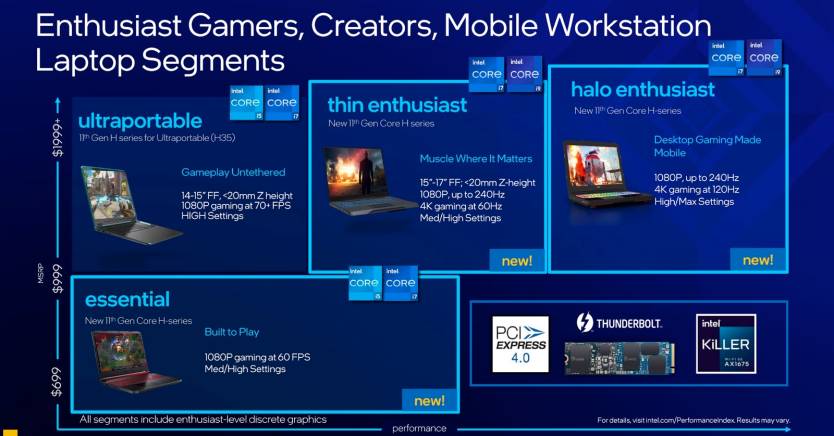
Intel 11th-gen Tiger Lake-H processors – gaming performance.
Intel says that the new Willow Cove Core microarchitecture will deliver 19% gen-on-gen multithreaded performance improvements, as well as support for faster discrete graphic cards and faster storage speeds.
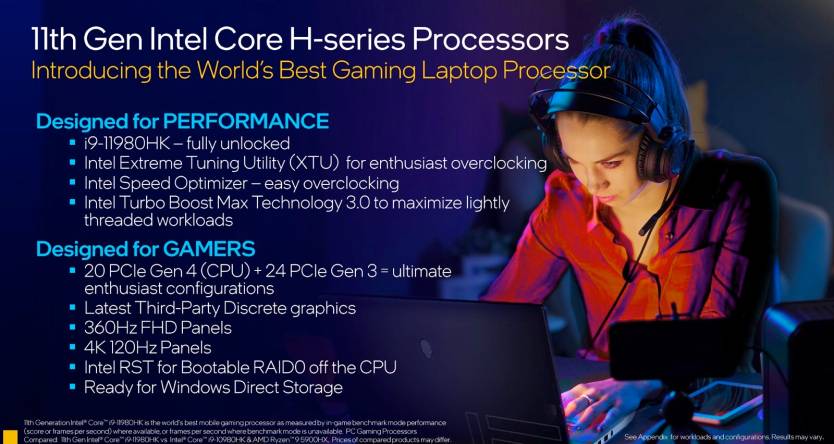
Intel 11th-gen Tiger Lake-H processors – gaming performance.
"11th Gen Intel Core H-series processors take mobile gaming, content creation, and commercial workstation systems to new heights," Intel's Chris Walker said in a statement. "These new H-series processors are an exciting extension of our 11th Gen mobile family with double-digit single core and multi-core performance improvements, leading gameplay, direct attached storage, and 20 PCIe 4.0 lanes for true enthusiast-level platform bandwidth. 11th Gen H-series is the industry's most performant mobile processor that empowers users to game, create and connect with leadership performance at any enthusiast form factor.
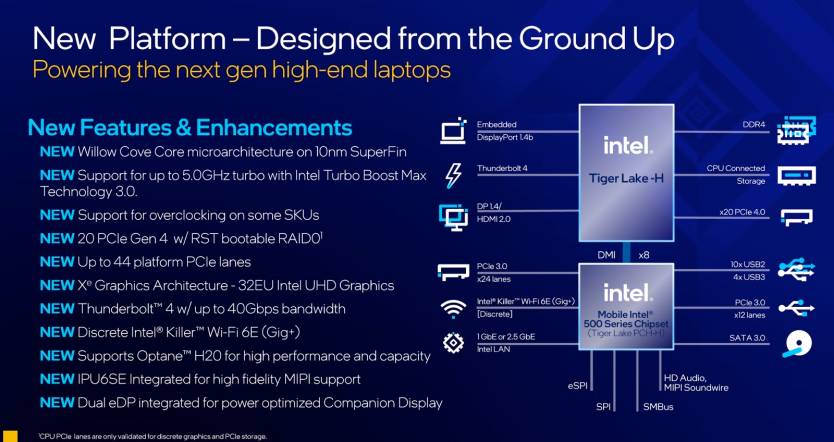
Intel 11th-gen Tiger Lake-H processors – key features.
The 11th-gen Intel H-series chips are built on the 10nm SuperFin process. They feature up to 8 cores and 16 threads and turbo performance up to 5.0GHz. The CPU can directly access the high-speed GDDR6 memory from graphics cards, which leads to higher framerates, lower latency, and faster loading of large textures during gaming. The chip offers 2.5 times the total number of PCIe bandwidth to the CPU compared to 10th-gen H-series chips and three times the total PCIe bandwidth compared with other industry processors.
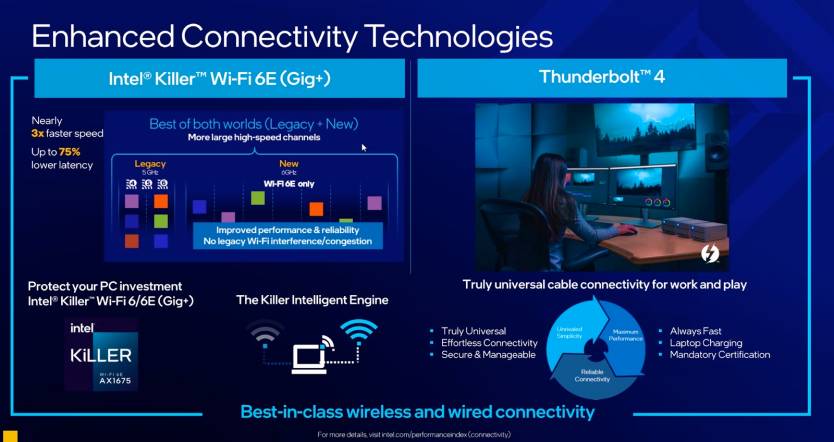
Intel 11th-gen Tiger Lake-H processors – new Intel Killer Wi-Fi.
The new Intel H-series processors have 20 lanes of PCIe Gen 4, a first for laptops. The Tiger Lake-H support 4K HDR/Dolby Vision streaming, Intel Optane memory, Thunderbolt 4, and a new Intel Killer Wi-Fi tech — that's 6GHz Wi-Fi 6E (Gig+) connectivity.
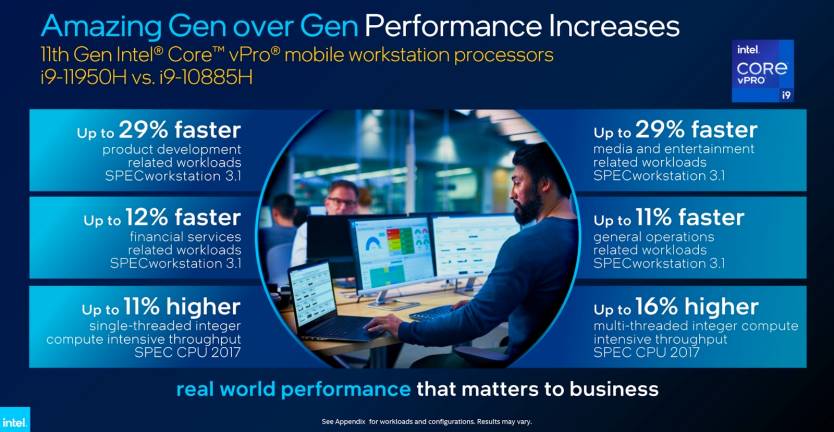
Intel 11th-gen vPro H-series and Xeon W-11000 series chips – performance improvements.
Intel's Tuesday announcement doesn't concern just processors that will power consumer laptops to deliver high-performance gaming and other consumer PC experiences. Intel also announced the new Intel vPro H-series Processors and the Intel Xeon W-11000 series mobile processors that will power enterprise laptops. Like the Intel Core Mobile H-series chips, the vPro and Xeon processors will deliver notable performance improvements compared to their predecessors.
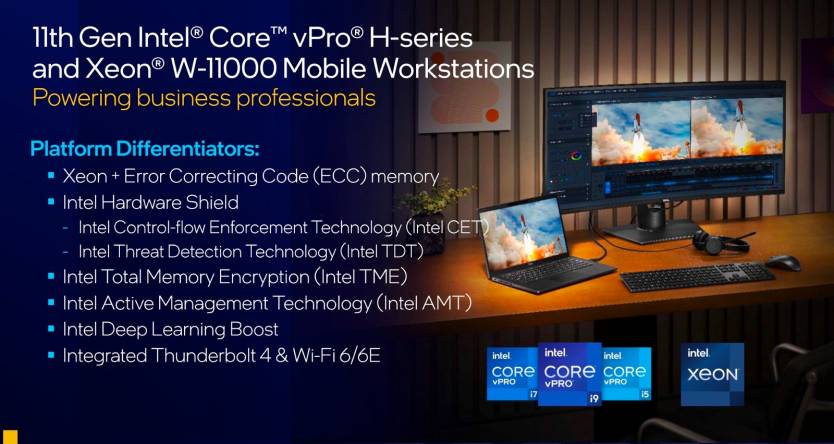
Intel 11th-gen vPro H-series and Xeon W-11000 series chips.
These processors feature various technologies meant to improve productivity and security at the workplace. One of the standout security features built into the new vPro chips is the new Intel Hardware Shield that's supposed to prevent all sorts of attacks from hackers:
[Intel Hardware Shield] provides the world's most comprehensive hardware-based security for business, and the industry's first and only silicon-enabled artificial intelligence threat detection to help stop ransomware and cryptomining attacks for Windows-based systems. It is also equipped with Intel Control-flow Enforcement Technology, a ground-breaking technology to help shut down an entire class of attacks that long evaded software-only solutions.
The new 11th-gen Intel Core Mobile H-series and Xeon W-11000 series chips will power more than 80 "enthusiast" laptop designs this year, although Intel has not specified any specific products or launch dates for them.
